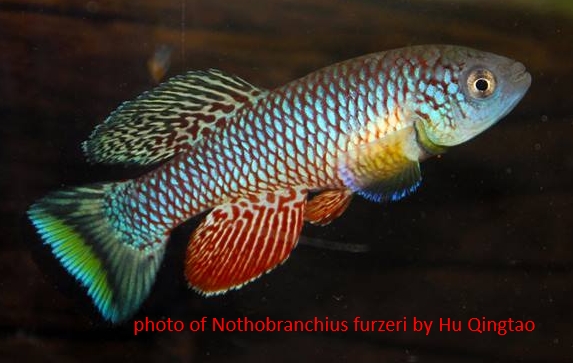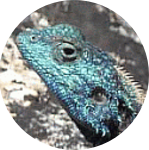About This Project
Can a cheap, over the counter pill, prevent the onset of ageing-related diseases and extend lifespan? I use the short-lived fish (9 to 12 weeks), Nothobranchius furzeri , as a model organism to test compounds for lifespan altering affects. Using my fish to quickly identify candidate supplements would save time in testing the different compounds on long-lived (3 years) mice and rats ; and instead research can quickly proceed to human trials.Ask the Scientists
Join The DiscussionWhat is the context of this research?
A multitude of such nutraceuticals are available but are any really effective?
Nothobranchius furzeri can be used to test compounds for lifespan altering affects (PMID: 16461283). Part of the work is obvious (I count the days the fish live) while another aspect is more technical. Fish are killed and their brains examined for signs of disease.
In this project I am interested in signs of brain disease. Specifically, the production of scar tissue by glia; the presence of inflammation; and the abundance of misfolded proteins (such as misfolded tau and alpha-synuclein found in dementia). We know that with age there is an accumulation of misfolded tau and alpha-synuclein in the fish as well as increased glial scar tissue; and that anti-aging interventions affect these proteins in the fish.
What is the significance of this project?
- No systematic study has been done to determine which proteins change with age in Nothobranchius and whether these changes are correlated with changes in lifespan. Identifying a panel of proteins known to change in response to lifespan would provide other researchers with a starting point to work back to the biochemical mechanisms of ageing. This information can be used to develop more effective drugs against aging-related diseases.
- This research would also identify nutraceuticals supplements that could be taken to offset the risk of ageing-related diseases.
- I also work with under-graduate students, involving them in my work. This is an important learning opportunity for them---especially those that wish to pursue careers in scientific research and medicine. Your support will support them.
What are the goals of the project?
- Test several over-the-counter nutraceuticals on Nothobranchius furzeri and determine whether or not it affects their lifespan.
- Obtain protein samples and perform Western Blots to determine how the expression of the proteins change with age...
- ... and whether this expression pattern correlates with lifespan (i.e. do longer-lived fish have less of the pathological protein?).
- Publish the results. (I wish to publish Open Access but I'm not asking for funding for that now---lets first get the results!)
Budget
To determine whether the dietary supplements are protecting the brain from disease we need to analyse protein samples and measure the abundance of certain protein markers of disease. To do this we need to purchase chemical reagents to prepare the protein; and antibodies to view and measure the proteins.
The bulk of this budget is for the purchase of research consumables: reagents for Western Blotting: protein concentration quantification kit, protein size markers (to identify proteins by size); chemiluminescence reagents (to observe proteins on the blots); blotting paper (to blot the proteins onto); as well as antibody probes to look for and measure proteins of interest. The antibodies represent the largest fraction of the research costs. These antibodies are:
- Syn211 anti-alpha-synuclein (a protein implicated in Parkinson’s Disease)
- SMI311 anti-neurofilament (a protein marker of neurons and axons)
- Anti-tau antibody (a protein implicated in Alzheimer’s Disease and other dementias)
- Iba1 anti- allograft inflammatory factor 1 (a marker of inflammation)
In our current budget we are only seeking funding for the GA5 and actin antibodies. We would need to raise an additional $1620 for the other antibodies mentioned above. Right now we need the Western Blotting reagents and GA5 & Actin antibodies* to proceed with the experiments and see if the dietary supplements have any affect on lifespan. To see if the supplements have any affect on brain diseases such as dementia and Parkinson's Disease we need the Syn211, SMI311 and Anti-tau antibodies.
The budget breakdown includes the cost of shipping.
*The GA5 and Actin antibodies were obtained elsewhere.
Meet the Team
Team Bio
I have been keeping and breeding fish all my life and was elated to join a Nothobranchius research time in 2003. My interest in ageing began during a conference in 2001 where several ageing researchers spoke about their work. I walked out the lecture theater that day knowing what research I wanted to do.This project is a continuation of my PhD work to identify Nothobranchius proteins that change with age so we can better understand how the fish age, what about ageing kills them, and how anti-ageing interventions (like resveratrol treatment) prolong lifespan. I already have a lot of data but had to cut my work short to take up my teaching position. Now I want to get the data I need to complete my current dataset and publish the information.
When I am not doing science for fun, I relax by maintaining my home aquaria, growing planted aquaria, growing & breeding orchids and playing with my 6 month old son.
Tyrone Genade
I'm an Assistant Professor of Anatomy & Physiology at Northwestern College, Iowa. I research ageing, in particular, the ageing of the short-lived fish, Nothobranchius furzeri. My current research goal is to profile changes in expression of proteins known to be involved in mammalian ageing of the brain in these fish. To do this I need your help!
I hold a M.Sc. in Biochemistry and a Ph.D. in Anatomy & Cell Biology. One of my papers, Resveratrol prolongs lifespan and retards the onset of age-related markers in a short-lived vertebrate, has been cited over 500 times and my first paper on Nothobranchius aging (Annual fishes of the genus Nothobranchius as a model system for aging research) has been cited 78 times. My recent, 2014 paper (Resveratrol extends lifespan and preserves glia but not neurons of the Nothobranchius guentheri optic tectum), has been cited 7 times so far. I was born and raised in Cape Town, South Africa and now reside in Orange City, Iowa where I lecture Anatomy and Physiology to nursing students as my job and research for fun.
Protein expression profiling work began in 2013 as part of Post Doc and then ground to a halt when I took up my teaching post. I was also doing research on NT-020 and other lifespan extending compounds and am eager to get back to this research.
Alessia Montesano
Love for "brain" started during my Vet School in Naples at "Univeristà degli Studi di Napoli Federico II", in particular thanks to anatomy, neurology and neurosurgery classes, these lighted the fire for research.
After becoming DVM, I start PhD course "Model Organisms for Biomedical and Veterinary Research". It gives me the chance to combine my major interests with the study of laboratory models, used during the research, in particular focused on the comparative neuroanatomy.
My goal is find out which are the mechanisms that influence and change the brain structure and function during the aging process. Well, I would like give my contribute to help people with diseases correlated with aging.
Also, I would like to find the way to resolve the ethical issue, that involve using animals in researching, applying the 3Rs rules and helping the ethics committees to find the best combination.
Press and Media
Article published May 29, 2014, issue of The Sioux County Capital-Democrat, page 14.
Additional Information
I am not mentioning the particular dietary supplements. After my resveratrol research was misused to sell resveratrol supplements I have decided not to mention them without having definitive results that they extend lifespan or the slow/prevent the progression of brain diseases.These are the fish:

The Gonarezhou stain that I work with lives on average, 9 to 12 weeks.
Western blots (shown below) are used to identify and measure protein levels using antibodies. The proteins are extracted from tissue and then separated by size through a gel (that acts as a filter that slows down larger proteins). The proteins are then transferred onto nitrocellulose paper (this paper prevents the proteins from dissolving into solution). The paper, called the blot, is then incubated with antibodies that identify specific proteins. Using this method, I have previously shown that the expression of GFAP changes with age and this pathological increase in protein is reduced by resveratrol (http://www.ncbi.nlm.nih.gov/pubmed/23220248).

I have similar results for other proteins including tau, alpha-synuclein and neurofilament, but more data is needed to confirm the preliminary results.
Below is the uncropped image of what is shown as our banner. It is the entire left optic tectum (a large part of the Nothobranchius brain) seen under a confocal microscope. It has been stained with antibodies to tenascin-R (the red structures that house neurons) and L1-neural cell adhesion molecule (that makes the blood vessels and the the star shaped glial cells visible on the surface of the brain). This image never made it into my article: Resveratrol extends lifespan and preserves glia but not neurons of the Nothobranchius guentheri optic tectum.

Project Backers
- 18Backers
- 190%Funded
- $1,540Total Donations
- $85.56Average Donation


